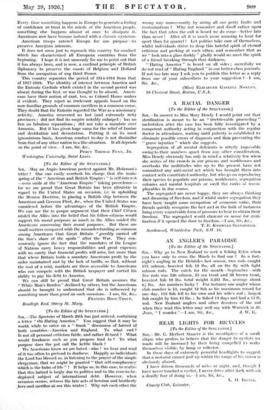ON HATING AMERICA
[To the Editor of the SsEcT.vroit.]
Stn issue of March 20th, which opens my subscription to your excellent journal, contains an item which moves me with hesitation to venture certain comments in reply. •• The first of the letters to the Editor is entitled " On Hating, America," and is written by " An . Englishman in india.'1! It gives what are probably the popular. causes for whatever feelings of animosity actuate the minds. of the British public., I should like to comment without argument on the points made;' with the hope of suggesting other trains of thought..
1.. Our attitude toward the War, 1914-1916. It does not seem worth while to . distinguish between the Americani Government and the American people, for the course of actioril of the former had to be guided by the support of the latter4 during this period. The factors therein were of critical importance.
2. The War debts. President Wilson was swept into a second term by an emphatic pacifist sentiment. In regarding the War loans made during the years in question as business transactions, American financiers were acting in accord with tradition which is so familiar as to be an international; commonplace.
3. American self-righteousness. Frankness compels me to admit that this country is steeped in it. But -I should like to add that Italy does not seem permeated with the spirit' of humility, that France does not attempt to pose as a model' of self-abnegation, and that, though Great Britain seems in a fair way to inherit the earth, meekness is not her most pro- nounced characteristic. No nation is in a position to cast the first stone. Certainly, we Americans should not do se.! It is dangerous to assert that British Indians are better treated than American negroes, unless familiarity with both races has equipped the writer to speak with authority. An estimate of the drug situation in the country is provocative without good result unless figures are furnished with it. It is not enough to say, " according to report?! • - So much for particular comments. The difficulties in -the way of international understanding seem at times insuperable. But they must be overcome. Governments habitually. adopt a realistic basis in their relations one with another. The people, on the contrary, ground their reactions instinctively. on sentiment or emotion. Public opinion is too frequently only a compound of ignorance and prejudice, because the vast majority of individuals cannot learn the facts. .. Govern- ments as a matter of course describe their policies in-elevated- moral terms—.terms which are calculated to enlist popular support. Thus arises a conflict between . the real . and the supposed motives of an action, difficulties of consistency and honour are created, and a haze of misunderstanding results. This haze to-day • amounts to a fog which is all but impenetrable.
One cardinal fact, I think, should be kept in mind in forming an; opinion : A nation---a GOvermnentacts according to what it conceives to be its self-interest. The conception may be blind, but it dictates, nevertheless. America has been taught by its history and by the mctraordinarfly heterogeneous character of-its population to dissociate itself frbria the rivalries of European States. It finds the nations to-day making hideous sport of the much heralded " spirit of Locarno." It finds a race for armaments in mad career, with vast sums of money being spent recklessly by Governments which complain at Washington of poverty. The -whole thing looks very simple to the popular mind. The people do not' want -to pull anyone's chestnuts out of the fire. Nor do -they want' to aid in financing another war by the cancellation of debts: Another war, they Irnow, now, would involve America.
Every time something happens in Europe to generate a feeling of confidence or trust in the minds of the American people, something else happens almost at once to dissipate it. Americans now have become imbued with a chronic cynicism.
American troops entered Europe for one purpose—to preserve Arnerjean interests.
It does not seem just to reproach this country for conduct which has characterized all European countries from the beginning. I hope it is not unseemly for me to point out that it has always been, and is now, a cardinal principle of British diplomacy to preserve the coasts of Belgium and Holland from the occupation of any third Power.
This country separates the period of 1914-1916 from that of 1917-1919. The identity of interest between America and the Entente Cordiale which existed in the second period was absent during the first; or was thought to be absent. Ameri- cans have their notion of cant, too, as Colonel House makes it' evident. They reject as irrelevant appeals based on the now familiar grounds of common sacrifices in a Common cause. They doubt that the Entente regarded the War as a missionary activity. America recovered no lost (and extremely rich) provinces ; did not find its empire notably enlarged ; has no lien on fabulous reparations ; did not take a mandate over Armenia. But it has given huge sums for the relief of famine and destitution and devastation. Putting it on its most ignominious basis, American conduct to-day is not dissimilar from that of any other nation in a like situation. It all depends on the point of view.—I am, Sir, &c.,
PERCY THOMAS FENN, JR.
Washington University, Saint Louis.











































 Previous page
Previous page